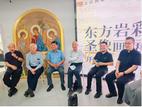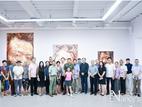On May 3, the 2025 Logos International Forum, an initiative of the Centre for Sino-Christian Studies within the Faculty of Arts and Social Sciences, convened at Hong Kong Baptist University (HKBU), seeking to encourage Christians to cultivate a holistic worldview rooted in their faith, to move beyond the conceptual separation of the sacred and profane, and to integrate their faith into every facet of life.
The forum's agenda included discussions across four primary themes: "Faith and Chinese Culture," "Faith and Mental Health," "Faith and the Workplace," and "Faith and Science." The morning session dedicated to "Faith and Chinese Culture" featured a dialogue titled "The Junzi and the Believer – A Dialogue Between Two Ideal Personalities," with presentations by Professor Tang Wenming, Head of the Department of Philosophy at Tsinghua University, and Professor Zhou Xuexin, former President of the China Evangelical Seminary.
Professor Zhou embarked on a comprehensive exposition of the Confucian ideal of the "junzi", often translated as "gentleman" or "exemplary person." He delineated the junzi as, firstly, a dedicated moral practitioner who embodies core virtues such as Ren (benevolence or humaneness), Yi (righteousness or appropriateness), and Li (propriety or ritual decorum). He referenced the Analects, noting, for instance, that "the junzi understands what is righteous; the petty person understands what is profitable." Secondly, the junzi is perceived as an embodiment of Heaven's Mandate (Tianming) and a conscious maintainer of cosmic and social harmony. Thirdly, the junzi is committed to a lifelong pursuit of holistic self-cultivation, striving for comprehensive moral and intellectual development, as encapsulated in the Confucian ideal that "the junzi is not a mere vessel (the junzi will not be limited to work at one official position)," signifying a well-rounded and versatile character. Fourthly, the junzi serves as a crucial inheritor and transmitter of esteemed cultural and moral traditions, engaging in continuous learning and reflection, as Confucius emphasized the importance of both learning and thinking. Fifthly, through a progressive path of self-cultivation, regulating the family, rightly governing the state, and bringing peace to the world, the junzi acts as a cornerstone of social stability. Finally, the junzi is a steadfast follower of the Way of the Mean, seeking balance and moderation in all things.
Transitioning to the Christian tradition, Professor Zhou discussed the concept of the "believer" or, as more frequently termed in the New Testament, the "disciple." He observed that the term "believer" gained particular prominence following the Protestant Reformation's strong emphasis on "faith." The essence of this ideal, he explained, is to live out the life of Jesus Christ, or to engage in the "imitation of Christ." This is powerfully exemplified in seminal spiritual works such as Thomas à Kempis's 15th-century devotional classic, The Imitation of Christ, and Dietrich Bonhoeffer's 20th-century work, The Cost of Discipleship (whose original German title, Nachfolge, simply means "Following"), which challenges believers to a radical and sacrificial following of Jesus.
Delving into the theological underpinnings, Professor Zhou elaborated that, according to Christian doctrine, humans were originally created in God's image and likeness (Genesis 1:26-28). However, they subsequently experienced a "fall" from this original state of grace, leading to the formulation of the doctrine of "original sin," most systematically articulated by Augustine. This, in turn, led some theological streams, particularly within Calvinism, to the concept of "total depravity," signifying a profound human inability to attain salvation through one's own efforts. Yet, redemption through Christ brings about a transformative renewal, wherein believers are called to "put off [their] old self, which is being corrupted by its deceitful desires; to be made new in the attitude of [their] minds; and to put on the new self, created to be like God in true righteousness and holiness" (Ephesians 4:22-24).
Professor Zhou further explained that faith itself is multi-faceted, comprising three essential aspects, often expressed in Latin: notitia, which is the cognitive element, the knowledge of the content and object of faith; assensus, which is the intellectual agreement or personal assent to the truth of Christ as savior; and fiducia, which is the volitional element of trust, a deep-seated reliance and personal commitment of one's life to God. He highlighted "justification by faith" as a central tenet of the Reformation, emphasizing that righteousness is imputed to the believer through faith in Christ. He also referenced Bonhoeffer's profound insight linking authentic faith inextricably with active obedience. Regarding spiritual practices, Professor Zhou mentioned the early church's concept of askesis (rigorous discipline and training), St. Paul's metaphors of athletic training for spiritual striving (1 Corinthians 9:25-27), and the structured spiritual exercises developed by Ignatius of Loyola. He concluded his comprehensive presentation by touching upon the theological distinction between special revelation (God's self-disclosure primarily through the Bible) and general revelation (God's manifestation through creation, human conscience, and other cultural wisdom, such as the Confucian classics), and noted historical attempts at integrating these traditions, exemplified by the work of Xie Fuya and his evolving concepts of the "gentleman Christian" and the "Christian gentleman."
Following Professor Zhou, Professor Tang Wenming delivered his presentation, titled "The 'Three Virtues Responding to Heaven' in The Doctrine of the Mean." He indicated his intention to offer a distinct contribution to the field, explaining that he would particularly elaborate on a concept he has identified through his textual interpretation of The Doctrine of the Mean. This concept, which he termed the "Three Virtues Responding to Heaven" or "Three Virtues of Serving Heaven", was central to his presentation.
The first of these virtues is Cheng (sincerity) or Si Cheng (reflecting on or striving for sincerity). Quoting the pivotal statement from The Doctrine of the Mean, "Sincerity is the Way of Heaven; attaining sincerity is the Way of Man," Professor Tang described Cheng as a fundamental attribute of Heaven itself. The human pursuit of "Si Cheng" involves two key aspects: firstly, revering and knowing Heaven, which distinguishes the junzi, who possesses a sense of awe and reverence, from the Xiaoren (petty person), who lacks such moral restraint. Secondly, it involves actualizing this sincerity within oneself, a process facilitated by what Professor Tang termed "recollection"—a turning inward to one's original, Heaven-endowed nature, thereby connecting with one's ultimate origin and affirming one's profound role as a co-participant with Heaven and Earth. He also noted the resonance of this concept with passages in Mencius, such as "reflecting on sincerity brings the greatest joy."
The second virtue identified by Professor Tang is He (harmony) or Zhong He (centrality and harmony). This virtue encompasses, on one hand, revering one's innate nature or steadfastly maintaining centrality—the state before emotions such as joy, anger, sorrow, and pleasure are aroused. On the other hand, it involves the appropriate and measured expression of these emotions, or rectifying emotions, so that they "all attain due measure and degree," which is called harmony. Professor Tang referenced texts such as the Book of Rites, Record of Music, which states that the ancient sages created music to respond to Heaven and rites to correspond to Earth, thereby establishing cosmic and social order.
The third virtue is Ren (benevolence, humaneness, or perfect virtue) or Wei Ren (practicing benevolence). For this, Professor Tang adopted the influential interpretations of the Song Dynasty Confucians, particularly Zhu Xi. In this understanding, Ren is not merely a social virtue but is conceived metaphysically as the very "mind of Heaven and Earth to produce things"—a dynamic, life-giving, creative love inherent in the cosmos. Human Ren, therefore, is the emulation and embodiment of this ceaseless, generative love of Heaven and Earth.
Professor Tang then wove these concepts into a systematic and hierarchical structure of virtues as found in The Doctrine of the Mean: The highest level, "Three Virtues Responding to Heaven," connect humans directly to the transcendent Heaven; the middle level puts Ren as the central virtue and considered inherent to human nature; and in the practical level, these inherent virtues are then put into action in daily life through the "Three Universal Virtues": Zhi (wisdom), Ren (benevolence), and Yong (courage).
Professor Tang then concluded that this system, with Ren being key and leading to good actions, is much like Christian ethics, where love is key and leads to good actions.
The presentations were followed by a dynamic dialogue session. A prominent theme that emerged was "imitation." Professor Zhou had spoken of the "imitation of Christ," while Professor Tang had emphasized "emulating Heaven and Earth." Professor Zhou were asked to elaborate on the potential distinctions and commonalities between Christian "faith" and the Confucian concepts of "sincerity" and "reverence."
In his response, Professor Zhou emphasized the centrality of imitating Christ in the Christian life and the multi-layered nature of faith (encompassing knowledge, assent, and commitment). He also acknowledged significant common ground in the idea of learning from Heaven and Earth, which he related to the Christian concept of general revelation, citing Pope Francis's encyclical Laudato Si' as a contemporary example of profound concern for creation.
Professor Tang then offered a clarification, noting that within the Confucian tradition, there is also a strong emphasis on "emulating sages" as these sages are themselves considered to be exemplary followers and interpreters of the Way of Heaven and Earth. He then posed a thoughtful question to Professor Zhou regarding the Christian doctrines of the "fall" and "total depravity," specifically inquiring how the Imago Dei (image of God) in humans could be understood as entirely corrupted or lost without the individual ceasing to be fundamentally human.
Professor Zhou explained that mainstream Christian theology generally holds that the Imago Dei, while severely tainted, marred, and distorted by the fall, is not entirely erased or annihilated. He carefully distinguished between certain Calvinist perspectives, which might emphasize human inability to respond to God's grace without prior divine election, and Arminian theological viewpoints. The latter, he noted, often incorporates the concept of "prevenient grace," suggesting that God bestows upon all fallen human beings a measure of enabling grace that restores a degree of capacity to perceive and respond to the divine call for salvation.












